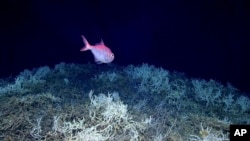In mid-April, the Government of Greece hosted the ninth Our Ocean Conference. This international effort brings together experts and representatives from across the globe who are working to protect the world’s ocean by advancing sustainable solutions to issues ranging from marine pollution to illegal fishing and advancing protected areas. This year’s theme was “An Ocean of Potential.”
“We have put sustainability of the ocean at … the center of our work. How do we make the most of this extraordinary resource?” said Ambassador Jessye Lapenn, the United States’ Senior Coordinator for Atlantic Cooperation, a group of 39 coastal Atlantic countries from Europe, Africa, and the Americas, committed to sustainable economic development, environmental protection, and solutions to shared issues facing the Atlantic Ocean.
A recent informal poll of the Atlantic Cooperation countries found that “One of the most important priorities was blue economic growth.”
“And so we've really begun a process of exchanging experiences, best practices, knowledge. Who's doing what? How is it working? How can we use this Atlantic Cooperation platform as a way of sharing all that … across geographies and around the Atlantic?”
This is where marine spatial planning comes in.
“So we think about which parts of the ocean are appropriate for economic development. Which parts of the ocean are relevant for sustainable fisheries? Which parts are relevant for offshore renewable energy? Which parts are relevant for tourism or sports and then which parts? Where does the biodiversity in the ocean really drive a requirement for protection? Which part are we going to protect?”
“Each country does that in their own way, bringing their own experience, their own knowledge, their own values, but all of them connected through principles around science,” said Ms. Lapenn.
“They want to use the best science and the best data. They also want to include all of their actors, from community to industry, to think about how do they make the best, most planned use of this extraordinary resource?… And so, we're able to exchange experience, success, maybe failure and also technology.”
“We all share this extraordinary ocean, and that means we all have a responsibility to use it,” said Senior Coordinator Lapenn. “Sustainable use and sustainable practices, and also responsibility to each other to share our knowledge and our experiences. And that really is what the partnership is very much committed to do.”






